Right….
Fears of OPEC-style gas cartel unfounded: Putin
Russian Prime Minister Vladimir Putin said Tuesday any fears that some countries could form an OPEC-style gas cartel were unfounded.
[top]

Right….
Fears of OPEC-style gas cartel unfounded: Putin
Russian Prime Minister Vladimir Putin said Tuesday any fears that some countries could form an OPEC-style gas cartel were unfounded.
[top]
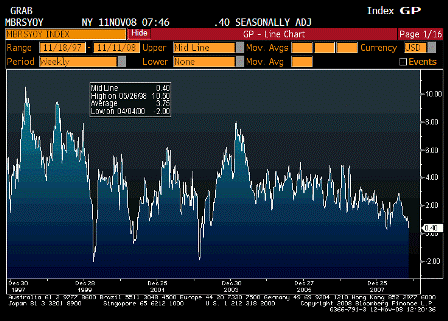
| Survey | n/a |
| Actual | 0.4% |
| Prior | 0.9% |
| Revised | n/a |
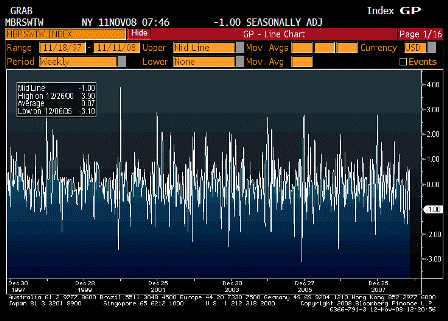
| Survey | n/a |
| Actual | -1.0% |
| Prior | 0.6% |
| Revised | n/a |
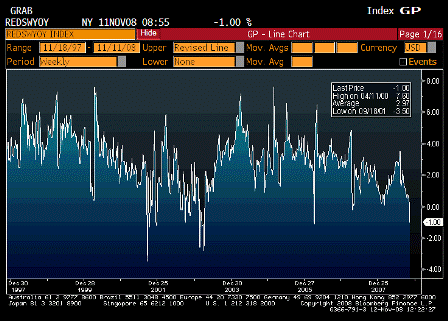
| Survey | n/a |
| Actual | -1.0% |
| Prior | 0.3% |
| Revised | n/a |
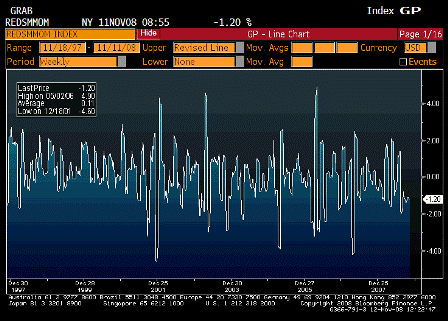
| Survey | n/a |
| Actual | -1.2% |
| Prior | -1.2% |
| Revised | n/a |
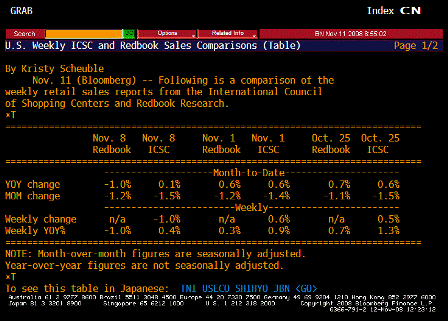
[top]
Doesn’t look as bad as many would expect.
Maybe it’s being supported by lower fuel prices.
TABLE-US chain store sales fell 1.0 pct last week-ICSC
(Reuters) The International Council of Shopping Centers and Goldman Sachs on Tuesday released the following seasonally adjusted weekly data on U.S. chain store retail sales.
WEEK ENDING INDEX 1977=100 YEAR/YEAR CHANGE WEEKLY CHANGE (percent) (percent) Nov 8 477.2 0.4 -1.0 Nov 1 482.0 0.9 0.6 Oct 25 479.3 1.3 0.5 Oct 18 477.0 0.9 -1.6
The ICSC weekly U.S. retail chain store sales index is a joint publication between ICSC and Goldman Sachs Group Inc. It measures nominal same-store sales, excluding restaurant and vehicle demand, and represents about 75 retail chain stores.
[top]
Goldman urged bets against bonds it sold-paper
By Supantha Mukherjee
Goldman Sachs, which acted for the state of California in selling bonds, has urged some of its big clients to place investment bets against some of those bonds this year, the Los Angeles Times reported.
The paper said that Goldman declined to discuss the details of its trading strategy.
Goldman spokesman Michael DuVally told the paper that the firm was no longer giving the trading advice to clients. He declined to elaborate.
The newspaper said the company did not inform the office of California Treasurer Bill Lockyer that it was proposing a way for investment clients to profit from California’s economic downturn.
“It could exaggerate people’s worries about our credit,” the paper quoted Paul Rosenstiel, head of the public finance division of the treasurer’s office, as saying.
The investment bank’s actions are not illegal, the paper said.
Goldman is an important underwriter of California municipal securities and over the last five years has earned about $25 million in underwriting fees from California issues, the paper said.
[top]
(email exchange)
Yes, that’s the issue when there is more excess capacity than any one producer can afford to ‘allow.’
The excess production capacity (until recently) has been under 2 million barrels per day. This has allowed the Saudis to be ‘price setter’/swing producer as all other producers could produce flat out,
and the Saudis could set price and let their output fill the remaining demand of about 9 million bpd.
In July, however, Mike Masters triggered a massive inventory sell off as passive commodity players and specs hit bids to reduce positions, and the demand for physical inventories also fell as it seems many physical inventories probably had been held at relatively high levels in anticipation of higher prices.
This meant the Saudis could not control price without major and obvious production cuts- maybe $5 million bpd- to speed the inventory adjustment and retain their position as swing producer/price setter.
I looked at (guessed) the latest announced OPEC production cuts as a sign the Saudis thought the inventory liquidation was largely past and that they were again able to set price and let production adjust to the residual demand. With other OPEC members cutting output some, the Saudis could set price and expect the residual demand that determines their output would be that much higher.
Yes, demand is down in many regions, but so far no figures released on world demand for crude has indicated an outright decline in demand. Yes, some supply indicators are up some, but others are down. The balance is not clearly tipping to a large enough cut in net demand to dislodge the Saudis as price setter.
Note that West Texas crude is over $3 higher than Brent- a wider spread than the shipping charges might indicate. This implies a shortage of WTI. But at the same time the WTI futures markets are in contango, indicating comfortable inventory levels. Also, the gasoline crack has gone negative vs WTI, indicating perhaps it is being prices off of Brent which means the marginal supply is currently imported gasoline as domestic refiners continue to produce well below capacity.
Russia is the large non-OPEC exporter, and the recent meetings with the Saudis and the below commentary indicate some form of cooperation is in process.
What the oil exporters should be hoping for is a world wide move to restore aggregate demand without an immediate policy to reduce fuel consumption. That will enable the oil exporters to increase their real terms of trade via price hikes.
The darker side is that instead of looking to optimize their real terms of trade, their primary focus may be on keeping the western economies ‘weak’ to keep them focused inward and allow the Russians freedom to operate as they please in their regions of choice, and hasten the exit of the ‘infidel’ from Iraq and the rest of the middle east. In this case, price hikes will be used to keep the western economies weak and off balance, as they confront inflation, weakness, and deteriorating real terms of trade and standards of living, with real wealth moving towards the oil (and other energy) exporters.
On the other hand it is possible the oil exporters want to keep prices low enough to discourage moves away from petroleum, especially in the auto industry.
Point is, currently and for at least the next several years, the Saudis/Russians control price, and we can only guess to what end.
>
> On Tue, Nov 11, 2008 at 7:16 AM, wrote:
>
> One bit of news, brought to our attention by our friend, Mr. Elio Ohep, the
> Editor/Publisher of the always interesting petroleumworld.com, is that of the
> anger on the part of Russian Prime Minister Putin regarding the current price
> for crude, and Russia’s apparent inability to do anything about it. Clearly
> Putin & Company are upset by crude’s weakness, for much of the current
> military build-up taking place there, and much of the infrastructure growth
> taking place is predicated upon high priced crude oil. Speaking over the
> weekend, Mr. Putin said that Russia must do what it can to influence oil
> prices. He said, in an interview on Russian national television, that We need
> to work out a whole range of measures that will allow us to actively influence
> the market…As one of the major exporters and producers of oil and
> petroleum products, Russia cannot stand aside from formulation of global
> prices for this natural resource. There is little that Russian can do however
> other than cut production and hope that others… especially OPEC…follows
> suit. The problem that Russia, and Venezuela, and Mexico, and Ecuador, and
> Indonesia, and Saudi Arabia and seemingly all of the oil producing
> nations….especially Iran…. face is that they need the cash flow from crude
> oil to keep buying the support of their restive populations. They’ve no choice,
> and low prices make their jobs all the harder, for in hoping to keep their cash
> flows high they need to pump more, not less, crude. Putin and Ahmadinejad
> find themselves as uncomfortable brethren in economic arms, hoping that the
> other will cut production.
>
[top]
No doubt current international fiscal plans can restore some measure of growth and employment.
They may even be sufficient to stabilize the eurozone via exports (if the eurozone can make it from here to there).
Not so clear is whether fuel consumption will be cut sufficiently to avoid a resumption of continuous price hikes and declining real terms of trade:
Obama set to push ‘big bang’ reform package
By Edward Luce
US President-elect Barack Obama intends to push a comprehensive programme of social and economic reform beyond an immediate emergency stimulus package, Rahm Emanuel, the next White House chief of staff, indicated on Sunday.
Mr Emanuel brushed aside concerns that an Obama administration would risk taking on too much when it takes office in January. He said Mr Obama saw the financial meltdown as an historic opportunity to deliver the large-scale investments that Democrats had promised for years.
Tackling the meltdown would not entail delays in plans for far-reaching energy, healthcare and education reforms when all three were also in crisis, he said. “These are crises you can no longer afford to postpone [addressing].”
[top]
A Quiet Windfall for US Banks
By Amit R. Paley
The financial world was fixated on Capitol Hill as Congress battled over the Bush administration’s request for a $700 billion bailout of the banking industry. In the midst of this late-September drama, the Treasury Department issued a five-sentence notice that attracted almost no public attention.
Section 382 of the tax code was created by Congress in 1986 to end what it considered an abuse of the tax system: companies sheltering their profits from taxation by acquiring shell companies whose only real value was the losses on their books. The firms would then use the acquired company’s losses to offset their gains and avoid paying taxes.
Lawmakers decried the tax shelters as a scam and created a formula to strictly limit the use of those purchased losses for tax purposes.
But from the beginning, some conservative economists and Republican administration officials criticized the new law as unwieldy and unnecessary meddling by the government in the business world.
>
> Strange that this only gets disclosed after the election.
>
Agreed!
[top]
(email exchange)
Seems none of them have any clue that they are better off doing it unilaterally and hoping the other don’t follow.
That would maximize their real terms of trade/standard of living.
This is our big chance for the us to act first, aggressively, and alone to absorb the entire world’s excess capacity rather than just our own.
We can have a payroll tax holiday and start up our infrastructure projects, etc. while encouraging others to hang tough on fiscal policy and sit back and watch their exports to the US skyrocket as they both build FX reserves (yes, encourage ‘currency manipulation’) and work to balance their budgets.
With economics, unlike most religion, it’s better to receive (real goods and services) than to give, and if others don’t know that it’s not our problem- it’s our opportunity!
>
> In purely economic terms you are correct, insofar as it is better to
> receive a bushel of wheat than to export mounds of coffee. The first is
> clearly a benefit and the 2nd a cost. But when you’re exporting
> something further up the value chain, there do seem to be some good
> multiplier effects which have a positive impact on domestic demand.
>
Any nation can set aggregate demand at any level it wants independently of external forces.
>
> I’d also like to see the Chinese embark on a serious infrastructure
> build for their interior, and encourage their population to become a
> nation of rampant consumers.
>
I’d like to see them continue to send all their stuff to us and accumulate $US financial assets.
But seems they may be too smart for that, as per their new stimulus program.
>
> I have no problem with everybody doing fiscal aggressively.
>
As above.
>
> I also want a weaker dollar so that the cost of servicing these dollar
> denominated debts declines in real terms.
>
I’d rather see them servicing their USD debt by net exporting to us to get the needed USD.
But seems our leaders are not going to happen either.
They are killing the biggest goose of all time.
[top]
(email exchange)
>
> On Fri, Nov 7, 2008 at 11:12 PM, wrote:
>
> Geithner’s very smart,
>
Then why couldn’t he even hit his Fed funds target? When I asked operations people at the NY Fed why they can’t just make a one basis point market around the target they said that would mean continuous ‘intervention’ all day which would be a lot of ‘work.’ They said they only wanted to intervene once in the late morning so were trying to ‘guess’ the right amount to intervene then. This is a ridiculous way to run policy!
It took them three tries on paying interest on reserves to get the ‘right’ level which was the obvious- set it at the Fed funds target.
They are the ones passing along the swap line requests and must know or should know the likely consequences of this madness and that the FOMC doesn’t fathom what’s going on, as part what could be the biggest blunder in ‘monetary policy history.’ How does the Fed even get to loan 30 billion to Mexico secured only by pesos without Congressional discussion of any kind? The total advanced is now up to some $580 billion, with the biggest chunk to the ECB, completely under any radar screen.
>
> But at a time when backbone might be nice along with brains, he’s not
> exactly worry-free. Or perhaps I should say that backbone would have
> been nice along with his brains at the New York Fed: I think he saw all
> too clearly the disaster in the making which hugely leveraged Wall
> Street balance sheets represented, but was way too go along to get
> along to put his foot down.
>
Worse. He was part of the decisions to not give ‘depositors’ their funds back in the Lehman failure, and part of the ‘lie’ that the Fed loaned Bear $31 billion when in fact it bought the securities.
>
> His testimony during the Bear hearings are a model of velvet-gloved
> disingenuousness, although in that it differs little from the testimony of
> his fellow savior of the banking system, Dr. Bernanke.
>
Exactly. I’ll give them the benefit of the doubt as the overwhelming evidence is they didn’t comprehend the subject matter.
>
> As you know, I’m all for Corzine, of the three rumored frontrunners.
>
The least worst. Remember his ‘whispers’ caught by mics during an address with the black clergy in NJ?
Also, I met with him a couple of years back to discuss how to question then Chairman Greenspan. He agreed with what I was saying but chose not to do it for reasons unknown. I subsequently wrote ‘Interview with the Chairman’ as a guide to any congressman questioning the Fed chairman.
At best he’s seriously ‘intellectually dishonest.’
Also note the TARP belonged in the Fed, not Treasury. The Fed ‘spending’ is monetary as it routinely buys securities/financial assets (like the $31 billion from Bear), while treasury federal spending is ‘fiscal’ like paying the soldiers and the postal workers, etc. If they put the TARP where it belonged it would not be part of the ‘budget’ and the spending not accounted for as part of the ‘deficit.’ I’m not so cynical to think the reason they gave it to Treasury was to allow it to show up as increased deficit spending and hopefully put a cap on ‘social programs’ to a misguided Congress. Instead I’d just call it more evidence of ignorance of monetary operations and public accounting.
Just one more thing- the Obama talk yesterday shows a continuing ‘upside down’ approach to the economic ‘problem.’ Seems to me both GM and the Banks, for example, need a population that can afford to buy cars and make payments (aka aggregate demand), which all the ‘investment loans’ and ‘financial injections’ don’t address at all.
Government always has a choice of providing additional public goods and/or supporting private consumption oriented output. For me the move to support private sector output such as cars and financial services would best be done with a ‘payroll tax holiday’ where the treasury makes all the fiscal payments which would immediately (and progressively) give working people an immediate, ongoing, and substantial increase in income to facilitate the payment of mortgages and the buying of cars. (If they don’t want to buy cars for non financial reasons so be it- let the industry shut down.) If instead government wants more public goods, it can facilitate the various public projects it’s been discussing to increase the output of public goods, and not necessarily for the further purpose of increasing the real output of private sector goods (always meaning to include services for both sectors, of course). When using up real excess capacity we can also have both, but at the macro level there is a real choice between public and private goods and services.
While it’s far to early to lose hope, all I saw with the first press conference yesterday was what looked like an undistinguished senator with no specific ideas as to what to do making a ‘sing songy’ presentation with very odd ‘mispeaks’ such as he talked to the living ex presidents, and something like he had a good transition team because it was given a lot of thought, etc. And marching up reps of corporate America to do nothing but stand in line behind him was to me an insulting piece of showmanship. The message was this is going to take time- he needs to talk to a lot of advisors, try to grasp the issues, and then decide on what to do. And with both deficit hawks and doves in his ‘inner circle’ and seemingly no personal conviction either way there’s no telling what will happen or when it will happen. What’s also clear ‘change’ so far is change back to the fossils of past Dem admins and the introduction of Chicago Dem politics to the federal level. And his two expressed policy statements- about China and currency manipulation October 24 and yesterday’s statement that Iran will not be permitted nuclear weapons- are both continuations of the Bush regime.
Yes, even the worst case is still better than what we had, or might have had, so this is not to say he wasn’t the best choice.
I’d better stop here!
All the best!
Warren
[top]
Still watching for the trend to head south.
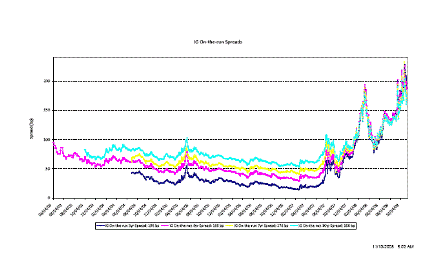
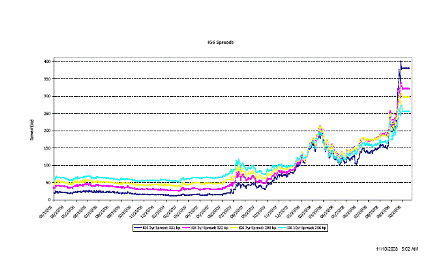
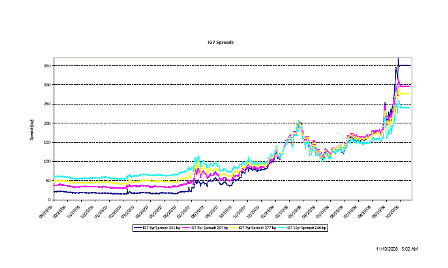
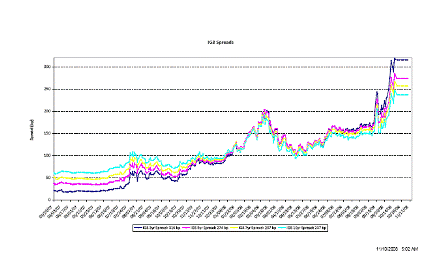
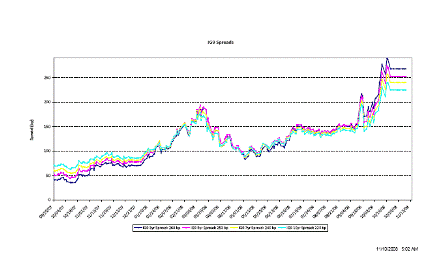
[top]